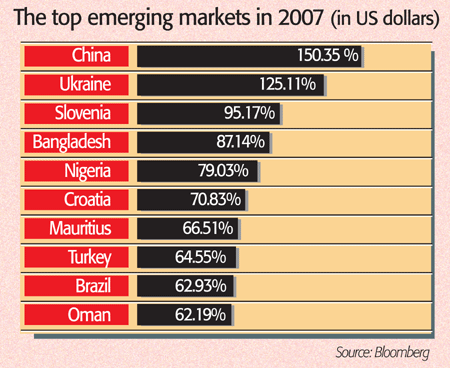
It’s been a long time since emerging markets were dismissed as “submerging markets”. They continued to sizzle in 2007, with the benchmark MSCI Emerging Markets index up by 34% in dollar terms, thus posting a fifth successive up year; it hit a new record peak in late October.
With emerging economies in sound shape, investors are hoping they can shrug off a downturn in the developed world as the latter grapples with the fallout from the credit crisis.
The emerging-markets boom has helped make 2007 a record year for flotations, offsetting the initial public offering (IPO) slowdown in New York and London, says David Litterick in The Daily Telegraph. Brazil, Russia, China and India accounted for $107bn of the $255bn raised up to the end of November, with seven of the top ten IPOs occurring in developing markets.
China’s CSI 300 index, which tracks domestic shares in Shanghai and Shenzen, tops the emerging-markets league table in dollar terms, thanks to local retail investors pouring into stocks in order to cash in on rocketing growth.
Meanwhile, investors’ mounting interest in promising “frontier markets” – typically so far off the radar screen they barely qualify as emerging markets – is evident from Bangladesh and Ukraine’s inclusion in the top ten, with Nigeria highlighting growing hopes of an African renaissance. Oman’s performance reflects a comeback by the Gulf markets after last year’s regional bubble burst.
The table also reflects strong growth in eastern Europe as the region continues to catch up with western Europe. Slovenia, which joined the euro this year, has also been boosted by local investors deploying their rising savings in equities. With GDP per capita still less than half the eurozone average in the Czech Republic, the region’s richest state by this measure, convergence has further to go – so the long-term equity outlook is positive, says Capital Economics.
Turkey and Russia still look reasonably valued, says Agne Zitkute of Pictet Asset Management, with lower interest rates pointing to stronger consumer demand in Turkey. Russia has lagged other emerging markets recently, but looks due to catch up now that president Putin has decided to back Dmitri Medvedev as his presidential successor and stay on as prime minister.
Investors expect the stability established under Putin to continue; the reduced political uncertainty could drive the benchmark index up by 20% by the end of the year as “a wall of money” floods in, Kingsmill Bond of Troika said last week. The most promising sectors are infrastructure and domestic consumption plays, says Eric Kraus of the Nikitsky Fund.
Also outside the top ten but back in the headlines is India, which hit a new record above the 20,000 level last week. Local investors have been jumping on the bandwagon, increasingly convinced that the Indian economy and markets can withstand global headwinds, according to Morgan Stanley’s Malcolm Wood.
India’s economy certainly looks relatively safe in the Asian context as exports comprise just 15% of GDP, and domestic spending and consumption have spearheaded growth over the past few years.
But whether the market – or any emerging market – is immune to global jitters is doubtful. Morgan Stanley says a global retreat from equities, due to a US recession, would help wipe up to 26% off the Sensex index next year.